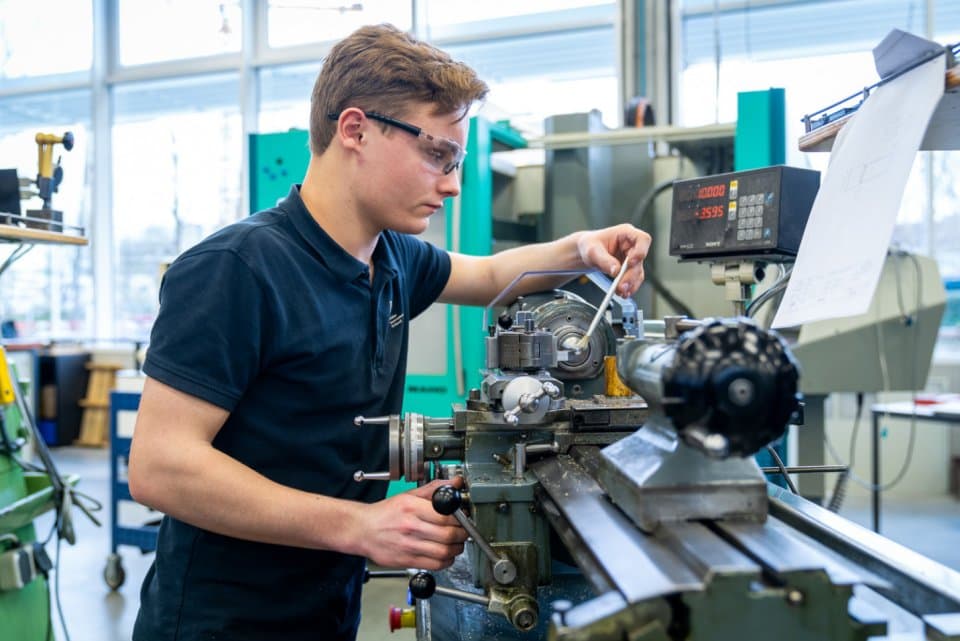Training microchip talent gets solid boost in four Dutch regions
A € 80.9 million investment strengthens technical education in regions Brainport, Delft, Twente and Groningen. There is a notable added role for the Leiden Instrumentmakers School.
Published on November 21, 2024

Leiden instrumentmakers School
Bart, co-founder of Media52 and Professor of Journalism oversees IO+, events, and Laio. A journalist at heart, he keeps writing as many stories as possible.
The Dutch Ministries of Economic Affairs and Education, Culture and Science have allocated €80.9 million to support the Brainport, Delft, Twente, and Groningen regions to start training additional technical talent for the microchip industry. This amount, spent over the next two years, must help to increase the influx of students into technical courses. This is the first step within the “National Reinforcement Plan of Microchip Talent” (also known as “Project Beethoven”), which includes a total of €450 million in funds until 2030.
The role now assigned to the Leiden instrumentmakers School (LiS) is remarkable. This vocational school was not part of the Beethoven plans until recently. “Given the high value that the microchip industry places on LiS graduates, the direction group recommends that the involvement of the LiS be made conditional for the Delft plan,” said the advisory committee headed by Hans de Jong.
The need for technically skilled personnel in the Netherlands is growing explosively due to the global demand for microchips. An estimated 38,000 additional technicians will be needed until 2030, 26,000 of them in the Brainport region. “Technical talent is the key to the success of our microchip industry,” states Hans de Jong as special envoy for the National Reinforcement Plan. ASML and other companies in the industry stress the strategic need for this plan and are providing solid co-financing totaling €310 million, including €126 million from ASML itself.
Regional commitment
Each region has developed specific plans to address the shortage of technical talent:
- Brainport Eindhoven is receiving € 45 million. The region is focusing on increasing intake and making training programs more flexible at the mbo, hbo and wo levels. It is also investing in attracting international talent and developing the Brainport Academy.
- Delft will receive €9.4 million to adapt study programs and attract international students. TU Delft, InHolland University of Applied Sciences and the Leiden Instruments School play an important role in this.
- Twente receives € 20.5 million and focuses on the regional growth of the microchip industry. Universities and companies in the region are collaborating on hands-on programs.
- Groningen receives €5.9 million and focuses on vocational training and training technicians for both the region and the rest of the Netherlands.
Lifelong Development
An important part of the plan is the Lifelong Development (LLO) program, which focuses on upskilling and retraining professionals. For the four regions, €30.6 million has been requested for the next two years. Plans must be further developed by early 2025. “Learning does not stop at a diploma. Through LLO, we create a flexible labor market that can respond to rapidly changing technologies,” de Jong said.
The government is taking a phased approach, with evaluations every two years. Based on the results, the remaining €369 million can be allocated. The Platform Talent for Technology (PTvT) will monitor and evaluate.
A national boost
The National Microchip Talent Reinforcement Plan is one of the largest initiatives in the Netherlands in technical education. In addition to regional cooperation, it also examines national and international synergies. The plan is in line with the national semicon agenda, which focuses on broadening the microchip industry.
With this investment, the Netherlands wants to strengthen its competitive position in the global microchip market. “We are not only building technology but also the future of our economy and society,” Ministers Dirk Beljaarts (Economic affairs) and Eppo Bruins (Education) conclude in their joint parliamentary letter.
